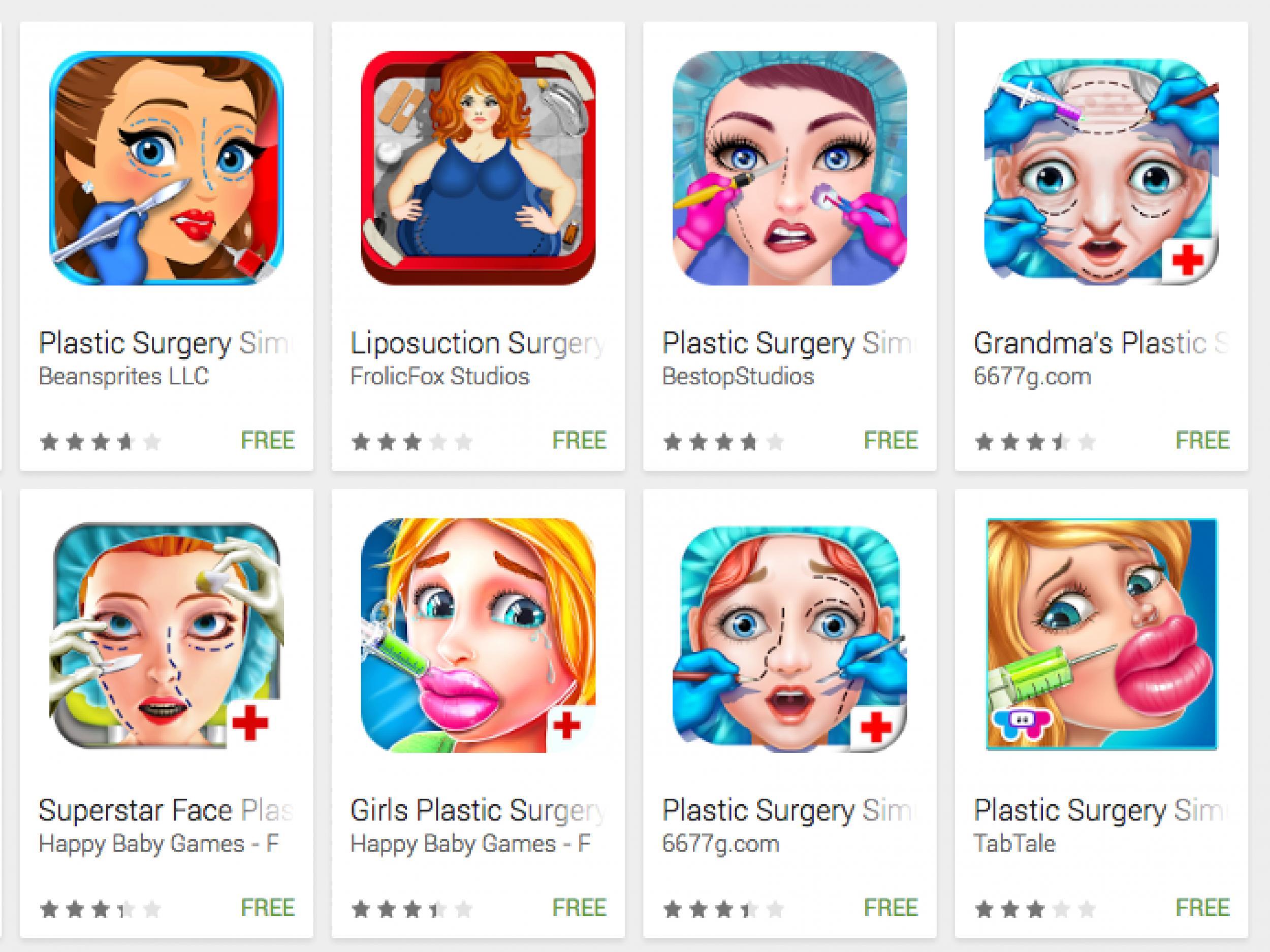The Independent's journalism is supported by our readers. When you purchase through links on our site, we may earn commission.
These are the terrifying plastic surgery apps aimed at young girls
In order for children to ‘win’, they must transform the facial and bodily features of supposedly ugly characters with procedures such as liposuction, nose jobs, lip fillers, double-eyelid surgery and more

Children as young as three are playing cosmetic surgery games, with the aim of preparing them for procedures they will have when they grow up. Yes. You read that right. Courtesy of Google, Amazon and Apple, there are hundreds of pinkified, princess-y, saccharine-laced apps available for free download that teach kids physical “perfection” is the end and cosmetic surgery is the means.
In order for children (primarily school-aged girls) to win, they must transform the facial and bodily features of supposedly ugly characters with procedures such as liposuction, nose jobs, lip fillers, double-eyelid surgery and more.
Aside from cementing the normalisation of cosmetic surgery and presenting it as harmless as applying lipstick, these apps divorce children from their bodies, teaching them they are malleable and must be fixed. They initiate kids into a world that encourages them to make a project of their physical selves, evicting them from the bodies they should be able to live from in order to fully experience life and feel safe in their skin.
In research investigating the effects of makeover games on eight to ten-year-old girls, Dr Amy Slater at the Centre for Appearance Research found that girls who played these games for just ten minutes experienced increased body dissatisfaction and a preference for traditionally feminine careers. Dr Slater believes that as these apps share similar properties as cosmetic surgery apps for kids, “playing a game that encourages you to more permanently alter a character’s appearance also would not be good for how girls feel about themselves and their appearance.”
Likewise, the Nuffield Council on Bioethics called plastic surgery apps “inappropriate and irresponsible” in their 2017 report and agreed app stores should exclude these games.
They highlighted that “rising levels of ‘body dissatisfaction’ are associated with factors including … increased use of the rating of images of the self and the body, for example through social media ‘likes’, and through self-monitoring apps and games”.
There is no ambiguity regarding whether body dissatisfaction is a risk factor for eating disorders, the rates of which for young people are climbing and manifesting at younger ages. Girls who do not feel comfortable in their bodies avoid engaging in day-to-day activities, such as socialising and extra-curricular pursuits. Self-harm among teen girls is on the rise, a behaviour also associated with body dissatisfaction.
It is imperative we address young people’s body confidence as a matter of urgency. In doing so, we work to ensure that children grow up with the emotional and psychological security necessary to pursue their dreams rather than having their minds colonised by a culture that indoctrinates them to believe their appearance is and always will be a top priority. Too many lives are hijacked by diet culture and fickle beauty imperatives, and now children are primary targets.
By addressing body insecurity in young people, we in turn tackle insidious weight stigma and appearance-shaming that is rife throughout society, which impacts employment opportunities, wages, medical care – not to mention the joy of which people are robbed. We need kids to grow into engaged citizens, embodying a secure sense of themselves instead of being lost in a mirror image.
Many parents realise first-hand that staying on top of these innocuous-looking games (many of which are disguised as caricature-based makeover apps) is an enormous, unrealistic task.
We are not asking for a blanket ban. We recognise that plastic surgery games focusing on reconstruction can be educational for children interested in medicine. Moreover, we learned that demanding the simple removal of these apps is not an effective strategy. In 2014, we flagged several of these apps in the iTunes and Google Play stores; within 24 hours, the apps quietly disappeared. However, after a few weeks, a brand-new batch of these apps surfaced in both stores, setting us up for an unsustainable game of whack-a-mole.
We are keen to liaise with these platforms to dialogue and act as a resource in policy-making around these apps. To date, we have yet to receive a response from any of the three companies. In failing to address our concerns, Google, Apple and Amazon are endorsing – and profiting from – the harm these apps inflict on children’s self-esteem and mental wellbeing.
Help us create a healthier online environment for today’s kids and future generations. Let’s collectively keep reminding Amazon, Google and Apple of their corporate social responsibility to their youngest users. We know they can do better.
Sharon Haywood and Eleanor Higgins are campaigners for AnyBody/Endangered Bodies UK. They are working in conjunction with The Butterfly Foundation and La Trobe University on the #SurgeryIsNotAGame campaign. You can sign their UK petition here
Join our commenting forum
Join thought-provoking conversations, follow other Independent readers and see their replies
Comments
Bookmark popover
Removed from bookmarks